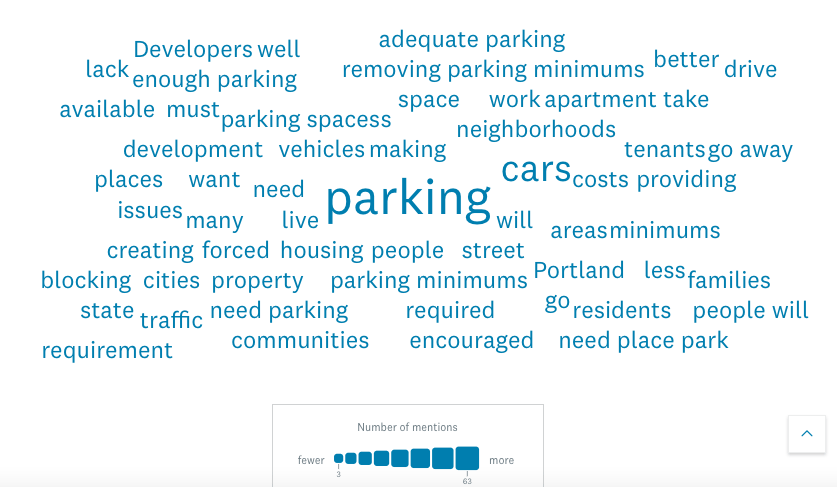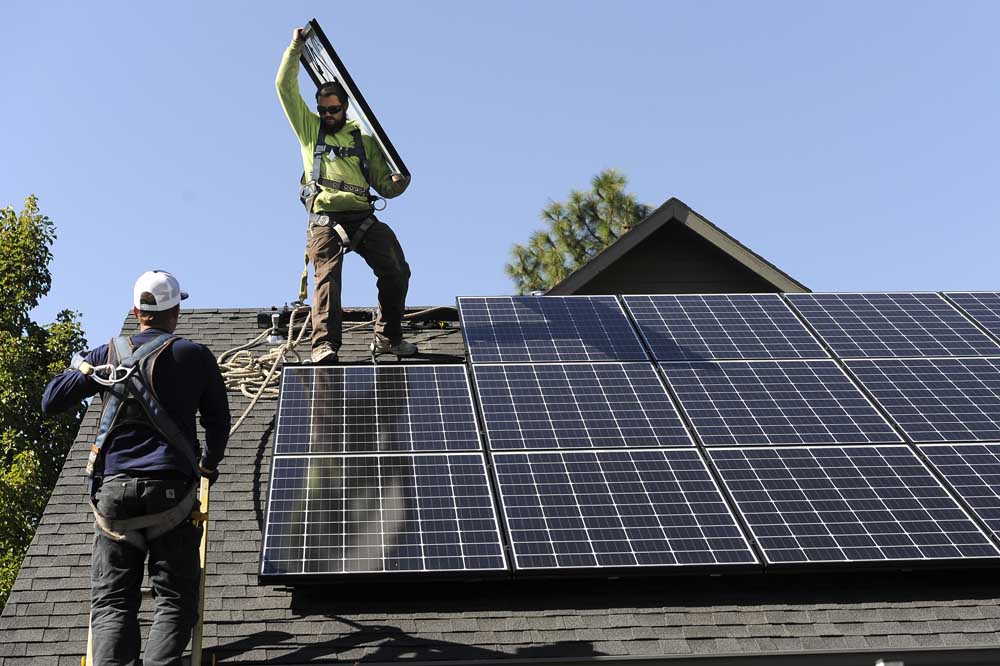Readers Respond: ‘Don’t Portland-ify Wilsonville’ with insufficient parking
Published 11:28 am Monday, March 24, 2025

- A word cloud shows how often reader respondents mentioned topics in this survey.
The City of Wilsonville is updating its parking regulations this summer, to comply with state climate requirements. We asked readers where they stand on new developments’ parking code requirements.
Trending
About 73% of more than 100 readers said they agree with enforcing parking requirements, while about 24% said they agree with removing parking requirements and about 4% are undecided.
Some readers said households in Wilsonville generally commute by car and often have multiple cars per household, so they need places to park existing vehicles. Other readers said relaxing the development rules could increase the amount of housing developers can build—and make housing more affordable.
Here’s what readers have to say on the topic. Responses have been edited for clarity.
Trending
“In populous areas, it’s important to ensure everyone has a chance to park their vehicles.”
“There’s not enough areas for parking with all the new building.”
“Removing parking minimums as I understand it will mean remove parking spots. While I understand the desire to encourage people to walk, bicycle and take public transit, thus not needing parking spaces, it is not realistic that everyone can do this. For parents with small children, elderly and rainy weather, I don’t see them walking, biking and using public transit in place of a car. At least for myself, hauling multiple bags of groceries on the SMART bus in the rain isn’t realistic, especially when a number of the bus stops do not have overhead shelter from the rain.”
“Parking minimums increase the cost of property developments. Those costs are passed along to future tenants.”
“Personal transportation isn’t going away at any time soon and providing anything less than adequate parking for residents and an occasional guest will only force those guests to park on the street (in many cases, illegally) and compromise traffic flow.”
“Many neighborhood disputes are over parking issues.”
“I don’t want streets to become jammed with cars, trucks, etc. It detracts from livability.”
“If you want people to visit local businesses and attend community events, you need parking.”
“When forcing on-street parking when none is available on the property, then existing residents are impacted, especially when having visitors.”
“There’s already not enough parking.”
“People come in two cars due to scheduling at times.”
“We need more transit, biking lanes and urban development.”
“There are so many places that have empty lots where it could be better used for more businesses or housing. Take Walmart in Woodburn for example. The only time it’s full is black Friday.”
“Transportation infrastructure does not exist to support the minimal parking requirements proposed.”
“Let each area self-regulate.”
“Residents should have parking. Portland is a mess because of no parking. Don’t Portland-ify Wilsonville.”
“We need parking! Nobody should be dependent upon street parking.”
“Wilsonville is a suburban community that relies on cars.”
“Most people have a car and need a place to park it. With no parking minimums, you’re forcing people to mark multiple cars on the street.”
“People will continue to have cars and need some place to park them.”
“Parking requirements have no effect on what people own. People are still buying cars; this state’s climate requirements are a joke.”
“Providing space to live includes space to place property and space for kids to play outside. Portland provides neither and continues to degrade living conditions for existing and new residents.”
“We have an over abundance of parking for commercial space, but lack adequate parking for residential neighborhoods.”
“There should be enough parking spaces for all tenants and visitors. Most two-income families need at least two spots, plus some for visitors.”
“People have cars to get around, no stopping that with walk zones only! Who shops with no car.”
“You’re allowing new housing without sufficient parking. People still own multiple cars. Neighborhoods are flooded with cars parked out in front of other people’s housing because they have nowhere to park. It looks trashy. It’s inconvenient for homeowners and renters. You’re clogging up old town, making it looked like every other crammed-together neighborhood in the city. You’re allowing people to add second houses on their lots to make up for the affordable houses crisis, but the reality is they’re renting them out for a ton of money and blocking up emergency access alleys. The only people you’re helping is the homeowners making money off the rentals they are cramming into their property without provided the additional home a place to park. Then the neighbors are stuck with all the vehicles they bring in.”
“Portland allowed apartments without sufficient parking and it’s a nightmare- More parking should be encouraged, not less.”
“I’ve lived in several communities that do not provide enough parking and people from the apartments end up parking into other communities and neighborhoods. Outside of the apartment communities there is often a lack of public parking, causing street congestion and taking over homeowners’ streets. Not to mention the inconvenience of having to park far from your home when there is no space available.”
“Most households have two cars.”
“We need to be realistic and know that families will have cars and probably more than one…. Plan accordingly.”
“Cars are here. Not providing parking will not discourage it. It will only clog up our streets with parked cars.”
“Wilsonville is a bedroom community. The majority of residents own cars.”
“I don’t believe we should leave it up to the developers.”
“We must have parking minimums for all existing and new developments. Nobody moves to Wilsonville to take public transportation or ride bikes. Cars are mandatory transportation here. Look at parking debacle in Villibois lining all the streets. Every apartment and single family development must have adequate parking.”
“This is a bedroom community and people have cars to drive to work. Must have ample parking to accommodate at least two cars per apartment or home.”
“There are so many ways to travel, and more are likely to pop up in the future. Owning a car is expensive (over $10K a year according to some estimates). Remove the requirement, spend more on public transportation.”
“Cars are parked 95% of the time, yet they dominate as the main mode of transportation in the Western world, largely due to their perceived convenience. To avoid the frustration of searching for parking, cities imposed rules requiring a specific number of parking spaces for each building. This has resulted in parking lots occupying 30% of urban land in the U.S., more area than the entire state of West Virginia. Incredibly, there are three empty parking spaces for every car in the U.S., equating to roughly 990 square feet per car. If you include the space needed to maneuver vehicles, the total jumps to 1,320 square feet per car solely for parking. By removing parking minimums, we can reclaim vast amounts of land for housing, green spaces, and businesses, creating more sustainable and efficient cities. Removing the minimums is about rethinking what our cities look like and prioritizing the human beings who live there over the automobile.”
“It’s already hard enough to find close-by parking.”
“Tenants are automobile drivers with few exceptions. They park their cars all over nearby neighborhoods. I live in Old Town. Ever since the three story apartment clusters went up at the north end of Magnolia, there are cars parking in front of neighbors houses, blocking access to mail delivery, taking homeowner parking, spilling into intersections. It’s a giant mess and tensions are rising. Homeowners hating the renters.”
“You cannot FORCE people out of cars. The reality is that the majority of folks working/living in the 97070 have cars. While METRO would like to force folks to ride transit, bike or walk this is simply not practical.”
“Street parking sucks.”
“Removing parking requirements has been horrible for the city of Portland.”
“Relaxed housing rule equals more housing.”
“I do think there should be ample and more than enough parking for all users of a particular residence or business.”
“People will have cars in order to go to work, travel or shop. Businesses that want to have customers must have parking places available in order for customers to come into the store. Eliminating parking places will not take away the need for vehicles in our cities. As long as communities are laid out/zoned with residences in one area, work places in another, retail in a third and restaurants and services in yet other areas the whole dream concept of walking or bicycling everywhere is not attainable. Even if a community was perfectly laid out it would not meet all requirements even for the most able-bodied individual. Then you mix in senior citizens that are not able-bodied, families with multiple children, weather in the northwest, and the whole concept of walking and biking all or even most of the time is ridiculous. Lack of parking and roads only creates traffic jams, wasted fuel for cars that are stuck in traffic and increased incidences of road rage. Look for common sense improvements not fantasy dreams.”
“There are not sufficient convenient transit options to prevent citizens from driving and this will only cause issues with people unable to find parking near their homes.”
“Recently built housing projects lack adequate parking, housing project residents are parking on local streets and in local neighborhoods causing problems in local neighborhoods.”
“Don’t let developers shirk their duty to provide adequate facilities by allowing them to have residents/customers fill adjacent neighborhoods.”
“So much street parking clogs up main street’s visibility.”
“Providing adequate off-street parking frees up street lanes for traffic. There are many, many streets in Portland where two cars cannot pass at the same time because both sides of the street are full of parked vehicles.”
“Condemning people to live car-free or surrounded by streets jammed with parked cars due to lack of driveways or carports is foolish. For better or worse, private cars are part of a free lifestyle in Oregon for the foreseeable future, and failure to incorporate parking into development will make streets more crowded and dangerous for pedestrians, drivers and cyclists.”
“I think they should double the minimum parking space requirement.”
“Let the market decide.”
“People do not want to be forced to use metro transit services. Elderly people don’t feel safe taking the bus by themselves. Mass transit doesn’t always get near where appointments are made. Friends have difficulty finding parking when they want to visit people who live in apartments.”
“No parking minimums will result in parking on the street because the developers are building from set back to set back. Illustration, the cottage clusters in first addition. Those who say that the market will require parking are dead wrong.”
“It’s totally ridiculous that this is being considered, especially in the suburbs, where most people will still need cars to get to where they need to go. It will not change behavior, all it will do is put more in the pockets of developers while creating parking issues in surrounding neighborhoods.”
“While some want to be dreamily idealistic and try to remove cars, the reality is that with the fleet getting electrified, there will be more cars, not fewer. Housing developers need to accommodate at least a reasonable if not significant portion of the cars associated with their residents. Just making parking someone else’s problem doesn’t make it go away.”
“I support removing parking minimums in cities because they often harm retail and worsen surface water issues, beyond just inflating housing costs. For retail, mandating large parking lots can spread out storefronts, making downtowns less walkable and reducing foot traffic that local businesses thrive on. Without those rules, developers could cluster shops closer together, creating vibrant, pedestrian-friendly retail zones that draw more customers naturally. On the surface water front, excessive parking creates vast impermeable surfaces—think sprawling asphalt lots—that increase runoff, overwhelm drainage systems, and contribute to flooding or pollution in nearby waterways. Scrapping minimums could mean less pavement, more green space, and better water management, aligning with sustainable urban goals.”
“If there is no parking, this will adversely impact the entire neighborhood.”
“Because as a practical matter people need to have a car and they cannot all go on the streets. Mass transit is not a viable option and people would not take it no matter where and how frequently it ran.”
“Parking minimums are essential to prevent a potentially dangerous scramble for a place to park a car. It should apply to all businesses and residential areas as well, especially high-density housing. Pretty obvious, I would say.”
“Nearby properties will feel the pain of insufficient parking.”
“Parking in Portland is a nightmare. Parking should be a requirement.”
“The real purpose of not requiring parking is profit for the developers at the expense of the neighbors. A single parent needing to get to the emergency room with a sick child shouldn’t have to walk three blocks down the street to get to their car because the apartment house next door takes up all street parking. The city should not permit new buildings to have no parking in neighborhoods unless they figure out a way for the tenants to not have cars, and that isn’t going to happen.”
“Builders are not building suitable homes with adequate parking for households. They need to plan development with parking spaces in this homes, townhouses and condos.”
“There is never enough street parking. Developers need to be forced to provide adequate parking for all buildings.”
“If there is not enough parking at housing complexes or the parking that is available is permit only this sends vehicles into surrounding neighborhoods. This has become an issue in Tigard where I live where cars are being parked in a small neighborhood at all hours and sometimes blocking house access.”
“Generally the market provides adequate parking and parking adds cost to housing, especially infill housing. In 25-50 years, it will be necessary to have options to a car.”
“People will continue to have cars. They will have to park them somewhere. The vehicles will be forced to park in the adjacent streets. This will clog up the streets making them unsafe for walkers and kids playing in the streets. If the purpose is to reduce our carbon footprint, in the not so distant future all vehicles will be electric. There won’t be a need for parking minimums, but unfortunately any recently-built properties will not have room for vehicles making it very inconvenient for drivers and others living in the area.”
“People have cars and unless public transportation becomes more robust and available parking areas should be required. I have lived in Portland where parking is a premium due to not enough spaces.”
“When you have company or teenagers in the home, you need more parking.”
“If you have guests for more than a day, they probably arrived in a vehicle and need parking for it. If you have teenage children, they are probably of driving age and need a place to park their vehicle as well. There should be at least two parking spaces on the property and street parking allowed as well.”
“Cars are a reality and they must be accommodated in a manner that does not result in overcrowding of streets and safety concerns that creates.”
“Too many cars are illegally parked.”
“Cars are not going to go away and people need them. They will be parking in other people’s driveways.”
“Excess pavement increases the heat index, makes cities less walkable, removes grass, shrubs, and trees, which improve air quality and lower heat idea, to make room for pavement.”
“Streets lined with cars instead of parking off-street pose a safety hazard to both pedestrians and vehicles.”
“Parking in the street is dangerous, unsightly, and diminishes the livability of the neighborhood. It should not be allowed for residents!”
“The private market will put their own money to work on a specific plan for each lot. That is usually the best path.”
“Too much empty parking spaces now, especially handicap. Home owners will be encouraged to put vehicles in their garage instead of in the street and filling garage with junk. More people will use public transit. It would be less expensive for developer to build homes and businesses.”
“Parking minimums often are over-required, removing parking minimums allows for more productive use of the site by having realistic amounts of parking as dictated by the market. Developers will not build something without parking if in an area that doesn’t have good transit, walkability and is primarily car-dependent. Why would they build a product they can’t market?”







